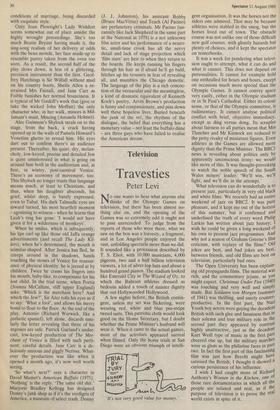Television
Travesties
Peter Levi
1\To one wants to hear what anyone else
11 thinks of the Olympic Games on television, but there has been almost no- thing else on, and the opening of the Games was so extremely odd it ought not to pass unrecorded. To judge from the reports of those who were there, what we saw on the box was a travesty, a fragment, and in Los Angeles people enjoyed the vast, unfolding spectacle more than we did. It sounded like a procession described by T. S. Eliot, with 10,000 musicians, 4,000 pigeons, two and a half billion television viewers, a lot of silver top hats and about a hundred grand pianos. The stadium looked like Emerald City in The Wizard of Oz, to which the Bahrain athletes dressed as bedouin added a touch of sinister dignity that out-Hollywooded Hollywood.
A few nights before, the British contin- gent, unless my set was flickering, were wearing red, white and blue pin-stripe tweed suits. This patriotic cloth would look good on the Home Secretary, but I doubt whether the Prime Minister's husband will wear it. When it came to the actual games, most of the activities appeared surreal when filmed. Only the horse trials at San Diego were an obvious triumph of intelli- 'It's not very good value for money.' gent organisation. It was the horses not the riders one admired. That may be because athletes were stabled in the smog, but the horses lived out of town. The obstacle course was not unlike one of those difficult new golf courses, with ghastly hazards but plenty of choices, and it kept the spectator on tenterhooks.
It was a week for pondering what televi- sion ought to attempt, what it can do and what it cannot. This does not depend on personalities. It cannot for example hold one enthralled for hours and hours, except on occasions much more special than the Olympic Games. It cannot convey space very easily, either in the Olympic stadium or in St Paul's Cathedral. Either its colour sense, or that of the Olympic committee, is rudimentary. It cannot analyse political conflict with brief, objective immediacy, except as ding versus dong. Its scruples about fairness to all parties mean that Mrs Thatcher and Mr Kinnock are reduced to the petty rivalry of miniature figures. Even athletes in the Games are allowed more dignity than the Prime Minister. The BBCI news is revealing about politics only by apparently unconscious irony; we would like more of this. It was thought-provoking to watch the noble speech of the South Wales miners' leader: 'We'll win, we'll fight, and we'll die in the attempt.' What television can do wonderfully is to present jazz, particularly in very old black and white films. We recently had an entire weekend of jazz on BBC2. It was pure pleasure, and it kept me out of the hottest of this summer, but it confirmed and underlined the truth of every word Philip Larkin has written about jazz history; wish he could be given a long weekend of his own to present jazz programmes. And why not a season of Graham Greene's film criticism, with replays of the films? Old jokes are best, and bad jokes are best, between friends, and old films are best on television, particularly bad ones.
The Open University has been explain- ing old propaganda films. The material was rich, and the commentary jejune, as you might expect. Christmas Under Fire (1940) was touching and very well and simply made. But Soldaten von Morgen (summer of 1941) was thrilling, and surely counter- productive. In the first part, the Nazi Youth boy actors were guying the decadent British with such glee and funniness that in their solemn and true military role in the second part they appeared by contrast highly unattractive, just as the decadent Kurt Weill type of music in the first part cheered one up, but the military marches were as glum as the philistine faces in part two. In fact the first part of this fascinating film was just how Brecht might have satirised the British; I thought it showed a curious persistence of his influence.
I wish I had caught more of Richard Anthony's Women in the Kitchen, one of those rare documentaries in which all the people are relaxed and real, as if the purpose of television is to prove the real world exists in spite of it.






































 Previous page
Previous page